Summary 
Exceptionally staged within a deep space, the scenic design exudes modern urban danger upon gang-ruled city streets, then the decadent decaying opulence of the Capulet home. Quickly paced and energetic with outstanding fight chorography, but at heart a convincing romance between a very young Romeo and Juliet. A slow-burn Mercutio is the performance of the show, an impressively impassioned young gangbanger, but the conclusion is more melodramatic than tragic and poignant.
Design
Directed by Gale Edwards. Set by Brian Sidney Bembridge. Costumes by Ana Kuzmanic. Lights by John Culbert. Original music and sound by Lindsay Jones. Fights by Rick Sordelet.
Cast
Tom McElroy (Montague), Lily Mojekwu (Lady Montague), Jeff Lillico (Romeo), Steve Haggard (Benvolio), John Judd (Capulet), Judy Blue (Lady Capulet), Joy Farmer-Clary (Juliet), Ora Jones (Nurse), Zach Appelman (Tybalt), Scott Westerman (Peter), Kenn E. Head (Escalus/Apothecary), Ariel Shafir (Mercutio), Brendan Marshall-Rashid (Paris), David Liveley (Friar Laurence).
Analysis
Guest director Gale Edwards' Romeo and Juliet fills the thrust stage at Chicago Shakespeare Theater with modern urban street imagery, impressively deep into the theatre. Four orange-and-white traffic horses with blinking orange reflectors are scattered downstage, and upstage are six graffiti-ridden rolling metal garage doors, three on each side of a set that resembles an arrow of fortune that points away from the audience. Broken glass within windows adds to the sense of danger and decay, and the upstage doors clatter open as gang kids swagger onstage, the Montagues in turquoise stage right and the crimson Capulets stage left. They represent modern gangbangers, young and posturing, wearing jeans and boots, denim and leather, long hair and chains. They overturn the traffic horses in shows of violent anger as the conflict escalates, then use the pieces as weapons as the showdown becomes a fast-paced and sprawling brawl.
Steve Haggard's blond-punk Benvolio valiantly halts the 1.1 street fight, but when the red-lit Tybalt struts in from upstage, the battle becomes a lethal sword battle swaying back and forth across the stage. Tybalt battles three Montagues at once, defending with his sword as the rumble grows to more than a dozen fighters. When the parents - the Montague and Capulet elders - rush in, the fight pauses then renews with even more vigor and more volume. Prince Escalus finally is able to stop the brawl, and everyone kneels in his presence, but the parents continue with angry shouting and accusations, so when Escalus starts to exit, he must turn back to make sure they disperse.
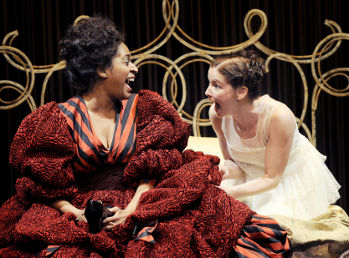
Jeff Lillico's dreamy young Romeo saunters onstage 1.2, a black jacket over his turquoise button-down shirt, barely aware of the street fight just concluded around him. He flinches from the confrontation with his parents, Montague in a suit with a fur-collared trench coat and Lady Montague in a severe gray business suit, and he contrasts with the conservative Paris in short-clipped reddish hair and suit and tie. Edwards begins a series of alternations - Juliet with Romeo - ending with their first meeting and balcony romance. Joy Farmer-Clary's Juliet is elegantly attractive, pale-skinned and pretty with long dark hair and a waifish expression that makes her seem, appropriately, mature beyond her character's thirteen years. She dallies with the Nurse 1.3, her bed rising from a center stage trap amid street grating, with chandeliers descending from the fly. She hides beneath her blankets, giggling girlishly, then rises to pummel the Nurse with a pillow then give her an affectionate hug. Juliet wears white red-spotted pajamas, crimson clearly the Capulet color, with the matronly Nurse in a scarlet gown with a white apron. Edwards cuts to 1.3, with Ariel Shafir's mercurial Mercutio mounting Romeo before the psychedelic Queen Mab speech, then nearly strangling himself with a belt - in a disturbingly suicidal sexual near-asphyxiation - before slapping Romeo five then galloping toward the masque upstage as the boys' flashlights pierce the darkness like tiny search lights.
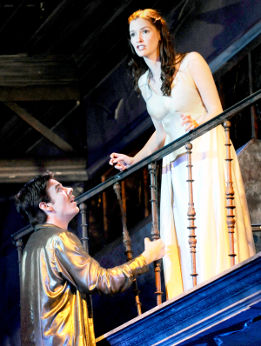
Another quick cut reveals the expansive Capulet residence 1.5, glimmering crimson and gilded with gold, stretching deep upstage into the depths of the theatre. Both the Nurse and Peter slap the bottom of a handsome young serving man, and once the masque is underway Lord Capulet must seize Tybalt by the throat and throw him down to prevent a gang fight from breaking out within his home. Finally, Romeo and Juliet spy one another, and they scurry from doorway to doorway in playful cat and mouse pursuit, criss-crossing back and forth across the stage in a teenaged love game, all giggles and coy glances. They then share breathless repartee in near darkness, far upstage, and Liilico's boyishly handsome Romeo must break off a kiss and remask himself as the Nurse enters in search of Juliet. He exits and returns 2.2 to woo Farmer-Clary's Juliet in her stage left balcony. The performers fare well, their words impassioned and breathless, but more importantly, they establish a passionate physical chemistry, as they seem unwilling - and unable - to take their eyes off each other.
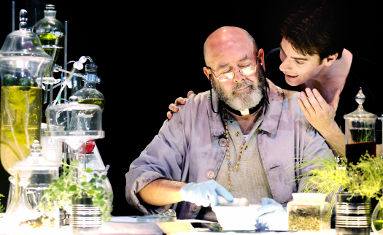
The supporting performances, as is characteristic of Chicago Shakespeare Theater's experienced ensemble of veteran actors, are uniformly strong. David Lively plays a mad scientist version of Friar Laurence, his fluorescent-lit desk rising 2.3 within a laboratory from a center stage trap. He works with beakers and bottles and Bunsen burners and test tubes, attended by two acolytes in robes, and he is bald and bearded, his lab coat unbuttoned to reveal the collar of a priest. Ora Jones' effusive Nurse, attended by the swishing Peter, approaches the Montague boys - Mercutio in a white T-shirt beneath a green jacket, a photographic negative opposite of Lillico's Romeo in a green T-shirt under a white jacket - enduring Mercutio's callow crudeness before herself taunting and torturing the inquisitive Juliet in 2.5. Juliet impatiently rubs the Nurse's temples, then bursts from her home to a big embrace and bigger kiss with Romeo at center stage, only pausing when separated by Lively's bemused Friar.
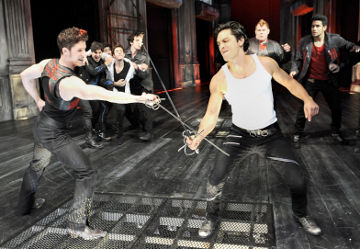
Best by far is Shafir's Mercutio, not so much jealous of Juliet as envious of the deep emotions that Romeo can feel, looking for a fight and dragging his sword blade across the street grating in 3.1. When Romeo is confronted by Tybalt in a black leather jacket emblazoned with a spidery red rib cage, Tybalt swats away an offered handshake, then slaps Romeo and spits in his face. Mercutio offers Romeo his sword, but Lillico's Romeo turns and walks away upstage. The ensuing duel between Tybalt and Shafir's Mercutio is thrilling theatre, spilling dangerously across the stage amid big swipes from swords and excited shouts from the observers. The lights flash in sudden silence as Romeo intervenes and Mercutio is wounded, and Shafir's Mercutio staggers, dropping his sword and falling to his side to reveal a bloody wound. He roars - "a plague on both your houses!" - and to a cinematic score Tybalt reappears upstage, the Capulets failing to restrain him as he fights to return. Pointedly, Romeo does not seek his fate, but finds his fate seeking him out in the form of the fiery Tybalt, and their swordplay devolves into a frantic fistfight until it ends with two bloody knife stabs from Romeo. The exciting sequence concludes with an appearance by Prince Escalus, miked and elevated within the stage left balcony, as a furious Lady Capulet charges the downcast Lord Montague. Edwards' production reaches intermission on this hyper-charged emotional note.
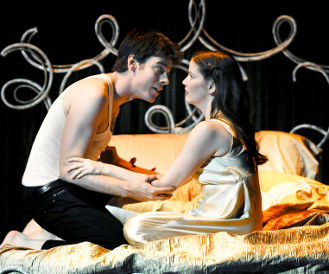
Edwards' second half does not fare as well sans Shafir's Mercutio, and Lillico and Farmer-Clary are out of their element in the histrionic dramatics, both much better in their lovely teenaged wooing sequences. Told of the news of Romeo's banishment, Juliet runs upstage - "bistered be thy tongue!" - and in 3.3 the thrashing Romeo is scolded by the Nurse - "stand up! stand up!" - before a pulling a dagger for a half-hearted suicide attempt that ends with him merely collapsing. After the romantic 3.5 wedding night - Farmer-Clary playfully dumps Romeo from her bed to conclude the lark-nightingale debate - Lord Capulet assaults her, knocking her to the ground and her mother atop the bed. She then must endure a forcefully attempted kiss from an insistent Paris, and when she flees to Friar Laurence 4.1, her putting a knife to her own throat is taken very seriously. Far more resolute and mature than her Romeo, Farmer-Clary's Juliet kneels then lies completely prostrate before her surprised father 4.2, then rejects the Nurse - "leave me to myself tonight" - in a display of inner strength and sincere dedication that Romeo was unable to match. She takes the vial and drains it, sprawling on her bed as Jones' Nurse shouts for help just moments later.
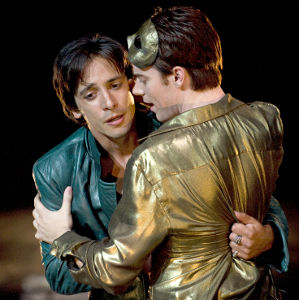
Lillico's Romeo begins to develop Juliet-like resolve too late, barely bearing the news of Juliet's supposed death 5.1 before a side trip to a seedy apothecary drug-dealer, a black man wielding a knife within a dimly lit garage. At the Capulet bier, Romeo dispatches Paris, then dies with head-scratchingly showy spasms downstage, and the rest of the conclusion also plays with disconcerting over-the-top histrionics, quite unnecessary since the tragic moments stand on their own. When Farmer-Clary's Juliet finds her lover dead beside her, she pulls a hidden knife - "o happy dagger!" - and stabs herself, exclaiming loudly in fatal pain. The final moments pack more emotional depth, with the more mature actors reflecting quietly, their shadows flickering against the walls behind them, and Edwards concludes her production with an appropriately dour epilogue.